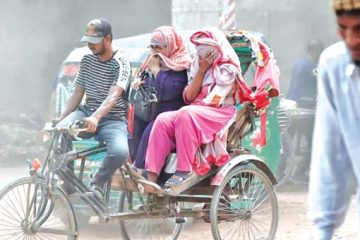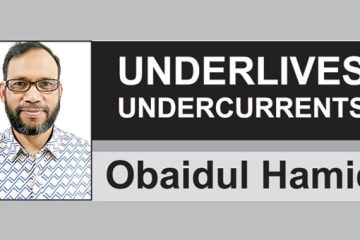Commentary
Mahmud ur Rahman Choudhury
All eyes and minds are riveted on the politics of the Country with the major political combines of BNP and AL in a tizzy over the upcoming polls. BNP and AL have issued their manifestos on 12 and 13 December respectively, promising everyone every conceivable and some inconceivable things too. Well, it remains to be seen how many of these promises will be fulfilled but if the past is any guide, right after the ceremonies are over it will be business as usual, meaning that there will be a government but little governance and there will be a parliament but little democracy.
Before going into a discussion of the pros and cons of the election manifestos, it is necessary to mention that the BNP and AL are mass political parties, the oldest ones in the Country, well attuned to the times and the demands, hopes and aspirations of millions of people of this Country. It ought therefore, to come as no surprise that both these parties would address the major issues with which the people of the Nation are concerned about.
The BNP and AL cannot stand to be compared with each other but as the “public”, compare we must, weigh each against the other and then vote for one or the other. The difference between these two parties do not lie in the issues that they have addressed where there is a surprising commonality; the difference lies in their “paradigms”, in the way that they see and approach politics, government and governance but more of this later after we have had a look at what all the parties have promised in their election manifestos.
The election manifestos: Pros and Cons.
The BNP and AL election manifestos are basically programmes of action which broadly tells us that they are going to contain inflation and keep prices of commodities low, that they are going to vitalize industries and agriculture, that they are going to ensure for us our basic right of food, shelter, clothing, education and health, that they aim not to reduce poverty but to eliminate it, that they are going to ensure employment for the masses of young people, that they are going to ensure food and energy security, that they are going to tackle militancy and terrorism, that they are going to ensure good governance through reduction of corruption, through changes in political culture, through transparency and accountability of public administration, through allowing the judiciary to function affectively and independently, through making the parliament affective and through implementation of local government and that through all these measures they are going to ensure social, economic and political equity and justice for the people of this Nation. Besides these concrete aspects, the BNP and AL manifesto contain a few pages of populist propaganda which is not as bad as it sounds because as mass political parties, they need to appeal both to emotions as well as to logic; fortunately though there is more of logic than emotion, more of substance than of bluster. These are all the pros of the BNP and AL election manifestos.
Coming to the cons, it needs to be said that the BNP and AL have somehow felt it necessary to unveil their manifestos in a 5 star hotel in Dhaka where only the “elites” of the civil society, the intellengencia, the foreign diplomatic corps and the media were allowed in, amid tight security. This is rather a contradiction in terms, if the BNP and AL still lay claims to being mass political parties – the masses in their teeming millions are out there in thousands of villages and small towns and it is to them that the BNP and AL “message” has to be carried to. It would have been much more becoming of these parties that the first ones to know of the manifestos are the people who will vote the parties in and out of government.
Except for a few rhetorical sentences, the BNP and AL have scrupulously avoided telling us what they are going to do about our corruption-ridden, inefficient and ineffective Judiciary, Police, Public Administration, Bureaucracy and a Military which makes a grab for political power every once in a while, for without a through-going reform in these, social, economic and political equity and justice which the parties promise in their manifesto is not going to come about.
The greatest of the cons however, is that these programmes of action, which the BNP and AL promise, will raise the expectations and hopes of the people for a better, brighter future and if these are not implemented, there will be a political and social backlash which will tear apart the polity. The consequences of not fulfilling expectations after they have been raised, can be devastating as the BNP and AL know well enough.
The ideological chasm between the BNP and AL
There is of course no denying the fact that the ideological divide between the AL and BNP is unbridgeable. While the AL insists on secularist democracy imbued with the “Spirit of the Liberation War”, the BNP emphasizes on religious ideals of Islam as a guiding factor of Bangladeshi nationalism and politics. Both points of view have their ardent, committed and entrenched supporters, almost in equal numbers, among the intellectuals, academics and the media. The masses too are equally divided between the AL and BNP but whether the masses understand the conflicting ideologies is difficult to say, particularly when these complex ideological underpinnings are reduced to populist political slogans of pro-Indian and anti-Islam (AL) on the one hand and anti-Indian and pro-Islam (BNP) on the other. Such reductionist approach to politics is a certain recipe for violent conflict.
The problem however, is that this basic issue of “secularist” and “Islamist” ideological approach cannot be resolved without conflict because they are so mutually exclusive that even a space and a language does not exist for a dialogue between the proponents of the two approaches. Each approach touches upon the entire gamut of political, economic and social institutions and relationships existing within the polity. Each approach calls for a redefinition of national identity and so, both AL and BNP attempt to monopolize political power in order to push through their own versions of “identity redefinition”. The people and the Nation are quite literally “torn” between these two conflicting ideologies providing justification to the idea that Bangladesh might well turn into a “torn state” like Pakistan, if the path to democracy is not rapidly widened and smoothed.
Concluding remarks
The unveiling of the BNP and AL election manifestos has been a great media show but what of the people for whom all this is supposedly meant? I apprehend that the people will continue to live with their poverty, their deprivations, their frustrations and their anger, as they have lived for the past 1000 years. These one thousand years have seen states and governments, kings and queens, leaders and politicians come and go without in the least bit touching upon and meaningfully improving the lives and living of the millions of people who have lived and still continue living in the geographical space now called Bangladesh. Sounds pessimistic, does it not but if we are to change all these, we must first of all get together, inspite of our politicians. This voting on 29 December 2008 could be the first step toward the changes we are all looking forward to. So let’s get together and make it happen on 29 December 2008.
Courtesy: thebangladeshtoday.com







